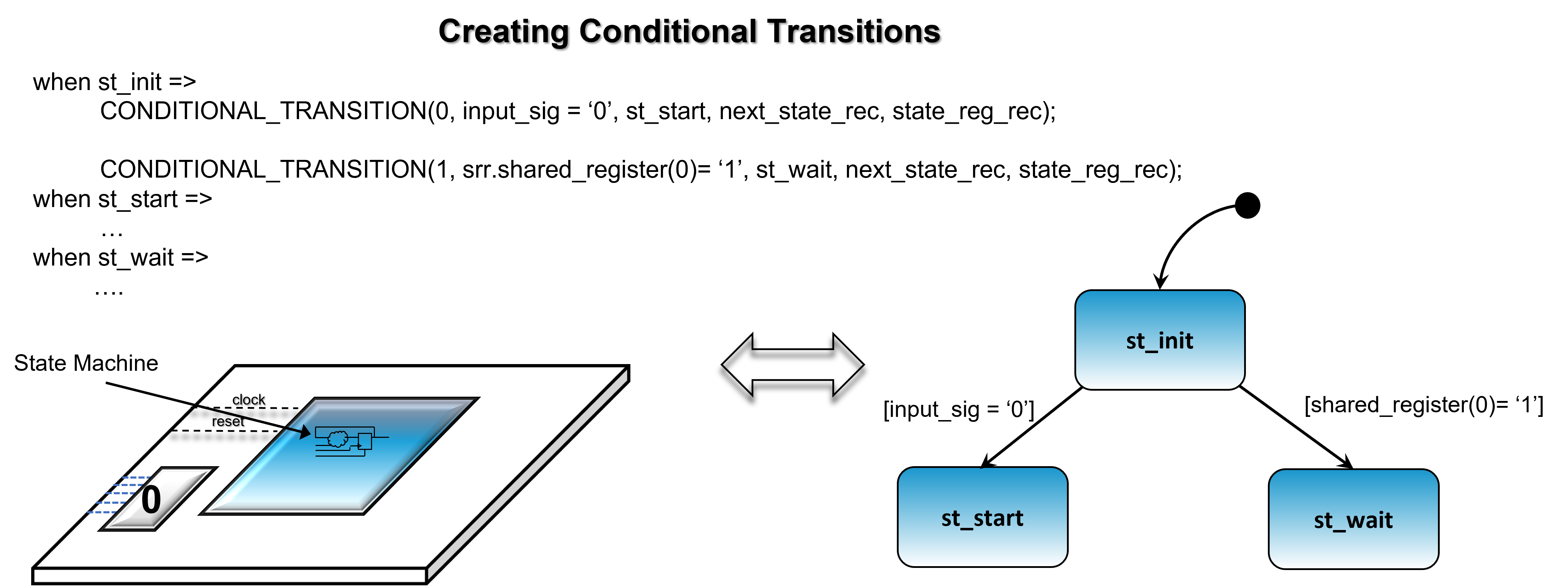Overview
The CONDITIONAL_TRANSITION procedure call schedules a state machine transition to occur in response to a signal change. When multiple calls to CONDITIONAL_TRANSITION are made within the same state, each boolean conditional is evaluated based on a priority_index. This priority_index is set by the first parameter of the procedure call. There can be up to five CONDITIONAL_TRANSITION calls made within in each state machine state. The conditional procedure call with the lowest priority_index that evaluates to TRUE indicates which state transition will occur.
For example, consider the following CONDITIONAL_TRANSITION procedure calls and the corresponding state diagram:

The semantics is such that if input_sig = '0' then the state machine will transition to st_start but if srr.shared_reg(0) = '1' then the state machine will transition to st_wait. In the rare occurrence that input_sig = '0' occurs in the same clock cycle that srr.shared_reg(0) = '1', then the transition will be to st_start. This due to the fact that SpeakHDL designates the conditional transition with the lowest priority_index to take action.
The use case for the CONDITIONAL_TRANSITION procedure calls is to emulate the conditional branching functionality that normally would be coded using if-then-else statements while still staying within the procedural programming paradigm. Inside a process, conditional operations are limited scheduling a state machine transition. This very limited range of operations is by design, and forces all branching operations to be explicitly mapped to a state. Doing so dramatically reduces the amount of debugging time that could result by inferring implicit states using traditional RTL.
Usage Example
- Todo:
- Add Example Usage
Example API Call(s):
CONDITIONAL_TRANSITION( 0, input_sig(0) = '1', st_done, next_state_rec, state_reg_rec );
Call Data [ 6 parameters (5 mandatory) ]
- Parameters
-
[in] priority_index [1] index indicating priority of boolean expression emulating priority if else (0 highest priority) [in] condition [2] boolean expression which when evaluates to true, action occurs [in] transition_state [3] state to transition to [out] next_state_rec [4] [in] state_reg_rec [5] [in] trigger_time_option*:[6] time type (simulation only) simulation time in which to bypass conditional to bypass waiting for condition to become true
Command Reference
Voice and Hotkey Commands:
- See also
- Conditional Transition Commands
Return Data
None
Command Parameter Mapping
- Parameters
-
[in] priority_index [1] "index <integer>" [in] condition [2] "when <boolean expression>" [in] transition_state [3] "go to [state] (<state>|<integer>)" [out] next_state_rec [4] [in] state_reg_rec [5] [in] trigger_time_option* [6] "(trigger time| timeout) (<timing function>)"
Command Return Data
None
Voice/HotKey Command Sequence
| Voice Command | HotKey Sequence |
|---|---|
| "conditional transition state done" | cc2 |
| goto st_done | |
| "when input sig zero equal one" | when input_sig(0) 1 |
Notes and Warnings
- Note
- 1) The boolean expression must not contain 'and' or 'or' expression. If a compound operation is necessary, first create a signal assigment then create a boolean expression using that signal.
2) The CONDITIONAL_TRANSITION procedure call also allows a non-synthesizable trigger_time_option parameter that can be used for simulation purposes. This optional parameter takes a VHDL time type as an input value and specifies the simulation time to trigger a conditional transition and bypass the condition parameter. The use case for this non-synthesizable option occurs frequently when writing a testbench. The optional parameter exists for convenience and by simply removing the optional parameter, the design would become synthesizable once again.
3) If the use of "if-then-else" statements are absolutely necessary, these statements can be placed within a component.
4) In SpeakHDL, the 'when-then-else' signal assignment and the CONDITIONAL_TRANSITION procedure call make up the only 2 ways to infer conditional branching of data flow.
- Warning
- The optional trigger_time_option parameter is a non-synthesizable construct and should only be used during simulation.
Types | |
| CONDITIONAL_ACTION | ( CONDITIONAL_FIRE_EVENT , ONE_HOT_TRANSITION , ATTACH_EVENT ) |
Procedures | |
| CONDITIONAL_TRANSITION( priority_index: in PRIORITY_INTEGER condition: in boolean transition_state: STATE_INTEGER signal next_state_rec: out NSR state_reg_rec: in SRR ) | |
| CONDITIONAL_TRANSITION( priority_index: in PRIORITY_INTEGER condition: in boolean transition_state: STATE_INTEGER signal next_state_rec: out NSR_ARRAY state_reg_rec: in SRR_ARRAY ) | |
| overloaded for indexed priority (array interface) | |